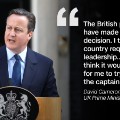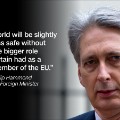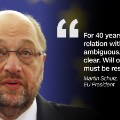begin quote from:
Will UK have a 2nd vote?

Could the UK hold another Brexit vote?
Story highlights
- The referendum result does not automatically trigger the UK's departure from the EU
- Some analysts see a slim chance a snap election could act as proxy second referendum
London (CNN)The
UK made a historic decision to leave the European Union on Thursday --
but has so far hesitated on pulling the trigger to go.
Now questions are being asked as to whether it has to happen. Here are the scenarios in the conversation.
Can the referendum be ignored?
The referendum itself was advisory, rather than legally binding, and nothing was legally set in motion as a result of the vote.
UK referendum: Full coverage
- Brexit Monday: Pound plunges again
- UK government calls for calm
- Barclays, RBS shares suspended
- Racist abuse in UK reported since vote
- #Regrexit? Voters voice doubt
- Could this man be next UK PM?
- 2nd vote petition created by Leaver
- Can wounds ever heal in divided UK?
- How the divorce will actually work
- How Britons really feel about Brexit
- Does this mean Trump will win?
- What will Brexit mean to me?
- Results map tells a big story
Theoretically,
the government could ignore the result, although doing so would
presumably prompt an angry reaction from the 52% of Brits who voted to
leave.
"The referendum doesn't
itself trigger Brexit," said Kenneth Armstrong, professor of European
law at the University of Cambridge. "It still requires the decision of a
government."
Specifically, a
Brexit requires the UK government to invoke Article 50 of the Treaty of
Lisbon, the EU legislation governing a potential breakup.
During
the referendum campaign, Prime Minister David Cameron, who led the
Remain campaign, repeatedly said that a Leave victory would
automatically result in the triggering of Article 50. But in the wake of
the shocking Leave victory, he has said he plans to resign in October
and will leave it to his successor to invoke the article -- raising
hopes among some that it might not happen.
Armstrong
said that while the chances of Article 50 not being triggered as a
result of the referendum were "very slim," the decision ultimately
remains a political one.
"With the
internal politics of the both the main political parties in such
turmoil, it's so hard to know what the position of the UK government is
going to be," he said.
Armstrong
said the vote was "an instruction from the British people to withdraw
from the European Union" and as such, "cannot be ignored."
However,
the longer the decision to invoke Article 50 is delayed, the more
opportunity there is for politics to intervene, he said.
For
his part, Cameron told the House of Commons on Monday that the
referendum result "must be accepted and the process of implementing the
decision in the best possible way must now begin."
Will there be a second referendum?
Many disappointed Remain voters have focused their hopes on calls for another vote, with more than 3.5 million people signing an online petition calling for a do-over, and a Labour MP publicly calling for a second referendum to be held.
There is no legal obstacle to a second referendum being held, analysts say.
However
holding a second, divisive referendum simply because some people were
not happy with the outcome is unlikely to prove a palatable solution,
said Armstrong.
"I don't believe that this petition for a second referendum in and of itself can halt Brexit," he said.
There's
one scenario under which the issue could be revisited at the ballot
box: A general election could serve as a proxy second referendum on the
issue.
"It would need to be a
general election in 3-4 months' time that indicated a changed politics,
and maybe then you'd be right to go back and check with the people that
this is what we really wanted," said Armstrong.
Will there be a general election?
But Cameron's announcement of his intent to step aside does not automatically mean a general election will be held.
In 2007, Gordon Brown succeeded Tony Blair as Prime Minister after Blair's resignation, without a public vote.
But
the current crisis engulfing British politics is uncharted territory,
and with so much at stake at a critical juncture in UK history, a
consensus might emerge that a general election was needed to give a
mandate to the new leaders, said Armstrong.
John
Curtice, a political scientist at the University of Strathclyde, said a
general election was most likely to occur as a result of the government
of Cameron's eventual successor losing a vote of confidence.
Whether
any potential snap election becomes a proxy on the Brexit issue depends
largely on how much the Labour Party is willing to make it one.
"Given
how many Labour voters voted to leave, this may just be a wound that
the Labour Party will not want to rub," said Curtice.
Can Scotland or Northern Ireland block a Brexit?
In
Scotland -- where 62% of voters cast a ballot to remain in the EU --
Scottish First Minister Nicola Sturgeon has suggested the devolved
Scottish Parliament could attempt to veto a Brexit.
She
also said Scotland could pursue a second referendum on leaving the
United Kingdom in the event of a Brexit. Scots voted by 55.3% to stay in
the UK at an earlier referendum in 2014.
Similarly,
in Northern Ireland, where 56% of voters want to remain in the EU,
Deputy First Minister Martin McGuinness has called for a poll on a
united Ireland.
Cameron said Monday
that Scotland's Parliament did not have the legal power to veto the
referendum result, a position backed by Mark Elliott, professor of
public law at the University of Cambridge.
As Elliott explains in a blog post,
this is because the UK Parliament in Westminster is sovereign, and has
not given away any of its powers to devolved legislatures like those in
Scotland or Northern Ireland.
But Jo Murkens, an associate professor of law at the London School of Economics, argues that while Scotland and Northern Ireland may lack the legal power to veto a Brexit, the threat of the breakup of the UK presented a "political and moral" veto.
It
is incumbent on Westminster MPs -- who were not just there to
"implement the view of the people," but to "exercise political judgment"
-- to block the Brexit to prevent the fracturing of the kingdom, he
told CNN.
"It's
not 52 percent to 48 percent -- it's 2 to 2," said Murkens. "Two
nations have voted to remain and two nations have voted to leave. And if
the overriding objective is to keep the United Kingdom together and
intact, then MPs have a duty to read this referendum result differently
and say in order to preserve the UK we will not leave the EU."
Pro-Remain MPs outnumber Leave backers in the House of Commons by about 3 to 1.
Armstrong
agreed that the sentiments in Scotland and Northern Ireland could play a
major role in how Britain's political class navigates its way out of
the crisis.
"Once that politics
starts to play out a bit more, and it becomes clear that it's not just a
case of the UK withdrawing from the European Union but the UK itself
falling apart, that again may crystallize minds in terms of what the
future looks like," he said.








Can the EU push Britain out?
Although
European leaders have expressed frustration at the UK's failure to
immediately invoke Article 50, they are effectively powerless to force
Britain to do so.
It is entirely up
to the defecting EU member to invoke Article 50 and no one in Europe
can trigger the mechanism, said Armstrong.













































No comments:
Post a Comment